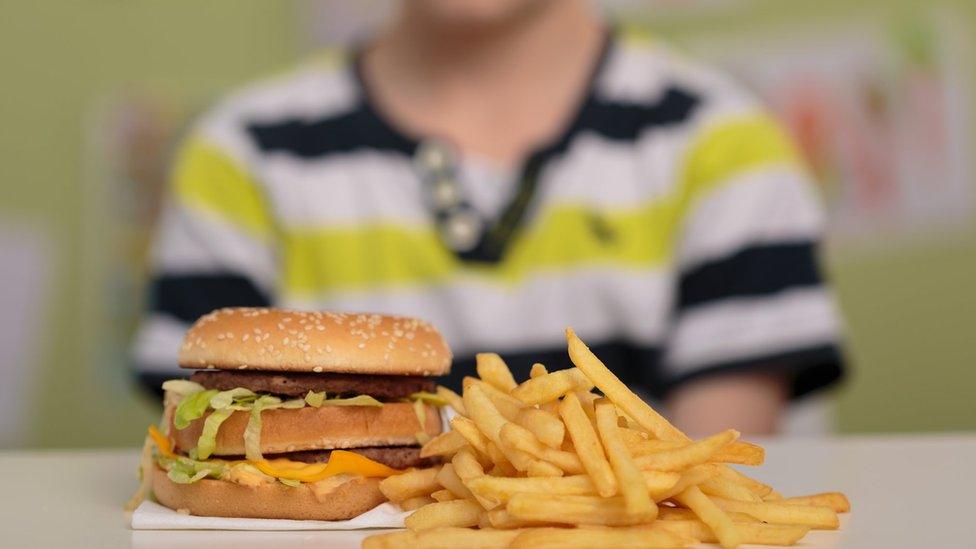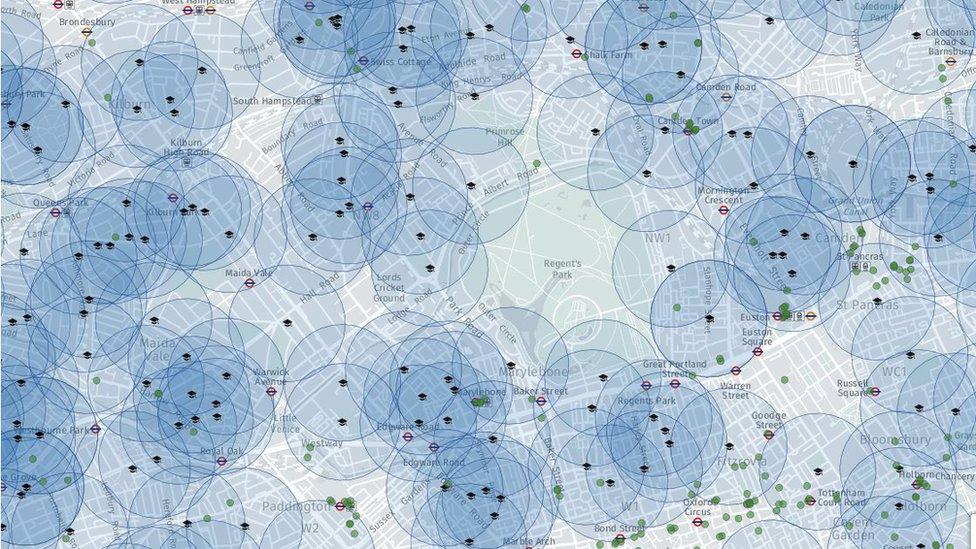Reality Check: Why ban fast food within 400m of schools?
- Published

London Mayor Sadiq Khan's new planning strategy says fast food outlets should not be allowed to open within 400m of schools.
It is part of his plan to fight childhood obesity and has been welcomed by experts contacted by Reality Check who felt it would be a good first step, with work also needed on existing fast food outlets.
Why 400m? The independent housing market analyst Dan Cookson has put all of London's schools on a map, external with a 400m circle around them.
In some parts of London, the only places that new fast food outlets would theoretically be allowed are in the middle of parks or the River Thames. In other parts of London, there are still a few High Street locations where they would be allowed.
Actually, the restriction will be a 400m walk rather than as the crow flies - Mr Cookson is working on a walking distance version.

The area around Regent's Park has a few streets where new fast food outlets could be opened
Access to takeaways
What does the research show? There's quite a lot of evidence that having fast food nearby leads to more obesity in adults.
There is, for example, this research from Cambridge, external, which found that people living closest to the largest number of takeaway food outlets were more than twice as likely to be obese than of normal weight.
These results were adjusted for income, which is important, because poorer people are more likely to be obese and fast food outlets are more likely to be located in poorer areas.
One of the report's authors, Dr Thomas Burgoine from the Centre for Diet and Activity Research at the University of Cambridge, told Reality Check: "There is increasing evidence of a link between access to takeaways and obesity.
"The evidence is stronger for adults than children, but this may be because of difficulties with conducting such research."

The Mayor of London's office cited research from Brent Council, external, which conducted a survey across seven secondary schools, four of which were within 400m of a fast food outlet and three of which were not, with responses from 2,418 children.
They were asked how far they would be prepared to walk to get to a takeaway - 27% of respondents said they would not bother going for takeaways at all if they had to walk for more than eight minutes, while 37% said they would only visit after school.
But the differences between the likelihood of children having lunch from a takeaway outlet if they attend a school close to one or further away from one were fairly small and the results were skewed by most of the children surveyed not actually being allowed off-site at lunchtimes.
Another report on the subject, external found that the food available near schools did have some effect on pupils' choices but that it was only a small effect.
Removing temptations
An interesting finding from this report cited by the Mayor of London's office, external was that in a study of the eating habits of pupils from a school in an urban area, the most popular local shop was the supermarket, having more visits than all the local takeaways put together.
The report's authors said this led to over-consumption of sugar being greater than over-consumption of fat.
Prof Naveed Sattar from Glasgow University says it's pretty clear that access to fast food outlets must make a difference.
"When I was a child we had a fish and chip shop about 200m from my school and lots of us went there - if it had been a bit further away maybe they wouldn't have bothered.
"It's pretty obvious that if you make things easy people will gravitate towards them."
And Prof Ivo Vlaev, a behavioural scientist from Warwick Business School, explained the theory behind why it was important.
"It's all very well changing intentions," he said, explaining that there's a gap between people's intention to eat healthier food, for example, and what they actually do.
"Reducing accessibility and removing temptations helps with that."


